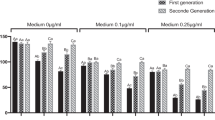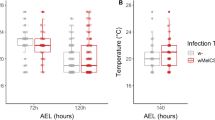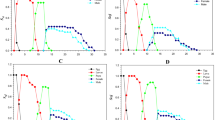Abstract
A RECENT paper by Hewlett1 has directed attention to the fact that the slopes of dosage–mortality curves for houseflies resistant to DDT are less steep than those for houseflies susceptible to DDT ; he explained this in terms of (1) the relation between the amount of DDT absorbed by flies and the external dose ; and (2) a possible variation from fly to fly of the DDT exerting a toxic effect at the primary site of action, a variation brought about or intensified by enzymatic detoxification of DDT in resistant flies. An alternative explanation of the phenomenon would be that DDT resistance in houseflies is genetically controlled, and that very few of the strains of insects so far examined represent genetically pure lines.
This is a preview of subscription content, access via your institution
Access options
Subscribe to this journal
Receive 51 print issues and online access
$199.00 per year
only $3.90 per issue
Buy this article
- Purchase on Springer Link
- Instant access to full article PDF
Prices may be subject to local taxes which are calculated during checkout
Similar content being viewed by others
References
Hewlett, P. S., Ann. App. Biol., 46, 21 (1958).
Davidson, G., Nature, 178, 863 (1956).
Author information
Authors and Affiliations
Rights and permissions
About this article
Cite this article
WILSON-JONES, K., DAVIDSON, G. Dosage–Mortality Curves for Houseflies Susceptible and Resistant to DDT. Nature 182, 403–404 (1958). https://doi.org/10.1038/182403a0
Issue Date:
DOI: https://doi.org/10.1038/182403a0
This article is cited by
-
Variations in the Insecticide Tolerance of Insects
Nature (1958)
Comments
By submitting a comment you agree to abide by our Terms and Community Guidelines. If you find something abusive or that does not comply with our terms or guidelines please flag it as inappropriate.



